(完整版)儒家思想英文
儒家思想总结英文翻译

儒家思想总结英文翻译The Summary of Confucianism ThoughtConfucianism is a school of thought that originated in China during the 5th century BCE and has greatly influenced Chinese culture and society. Confucianism is not just a philosophy but a comprehensive belief system that guides personal behavior, family relationships, and social interactions. This summary aims to provide a concise overview of the key concepts and teachings of Confucianism.The core principles of Confucianism are centered around the concept of ren, often translated as "humanity" or "benevolence." Ren is the highest virtue and represents the ideal human character. It entails cultivating empathy, compassion, and care for others. Confucianism emphasizes the importance of self-cultivation in achieving ren, as it believes that individuals should strive to improve themselves morally and intellectually to become virtuous individuals who contribute positively to society. Furthermore, Confucius believed in the importance of respecting and upholding traditional rituals and social hierarchies, as they provide stability and order in society. This emphasis on filial piety, or respect for one's parents and ancestors, is crucial in maintaining harmonious family relationships and social cohesion. Confucianism places a strong emphasis on the roles and responsibilities of each individual within the family and society. It advocates for the practice of the five key relationships, including ruler and subject, husband and wife, parent and child, elder sibling and younger sibling, and friend and friend. These relationships arecharacterized by hierarchical roles and reciprocal obligations, highlighting the importance of harmony and mutual respect.Confucianism also places great importance on education and intellectual development. Confucius believed that education was crucial in cultivating moral character and developing one's potential. He emphasized the importance of lifelong learning and believed that individuals should continuously strive for self-improvement. Education was seen as a means to achieve individual and societal harmony and prosperity. Confucianism also gave rise to the civil service examination system in ancient China, which selected individuals for government positions based on their knowledge and moral character.In addition to its emphasis on individual moral cultivation and social harmony, Confucianism also promotes good governance and ethical leadership. Confucianism argues that a virtuous ruler leads by moral example and rule with benevolence and righteousness. Good governance entails promoting the welfare of the people, upholding justice, and maintaining social order. Confucianism emphasizes the importance of leaders' responsibility to provide for and protect their subjects, acting in the best interests of society. Confucianism's influence extends beyond China and has had a significant impact on other East Asian countries, such as Korea, Japan, and Vietnam. Confucian values have shaped these societies' social systems, education systems, and ethical norms. Confucian teachings continue to resonate with many people today, as they provide guidance on personal conduct, family harmony, and ethical leadership.In conclusion, Confucianism is a comprehensive belief system that emphasizes personal morality, social harmony, and ethical leadership. Its core principles of ren, filial piety, and the practice of the five relationships provide a framework for individual behavior and social interactions. Confucianism's emphasis on education and moral cultivation aims to foster virtuous individuals who contribute positively to society. The enduring influence of Confucianism highlights its relevance in shaping East Asian cultures and societies.。
传统文化-儒释道英文版

Explore the Chinese CultureConfucianism (儒家; pinyin: Rújiā) is a Chinese ethical and philosophical system developed from the teachings of Confucius (Kǒng Fūzǐ, lit. "Master Kong", 551–478 BC).It is a complex system of moral, social, political, philosophical, and quasi-religious thought that has had tremendous influence on the culture and history of East Asia.Main Figure Confucious Mencius Hsun TzuMencius' Mother Moving Three Times学而时习之,不亦说乎?Is it not pleasant to learn with a constant perseveranceand application?有朋自远方来,不亦乐乎?Is it not delightful to have friends coming from distant quarters?温故而知新,可以为师矣。
If a man keeps cherishing his old knowledge, so as continually to be acquiring new, he may be a teacher of others.学而不思则罔,思而不学则殆。
Learning without thought is labourlost; thought without learning is perilous.敏而好学,不耻下问。
儒家思想英文介绍
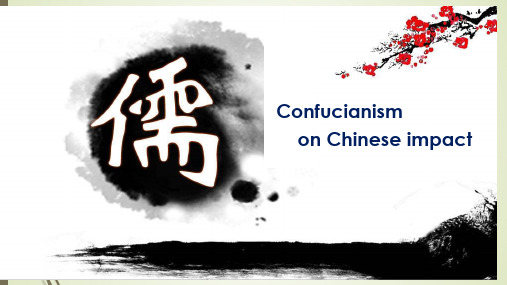
When I am fifteen, I aspired to learn. At thirty, I can be independent. At forty, I am not deluded. At fifty, I knew my destiny. At sixty, I knew truth in all I heard. At seventy, I could follow my heart’s desire without overstepping the line. (吾十有五而志于学,三十而立,四十而不惑,五十而知天命,六十而耳顺,
Confucianism on Chinese impact
What you do not want done to yourself, do not do to others. 己所不欲,勿施于人。 Learning without thought is labor lost; thought without learning is perilous. 学而不思则罔,思而不学则殆。 If a man take no thought about what is distant, he will find sorrow near at hand. 人无远虑,必有近忧。 Keep what you say and carry out what you do.
Core ideology of Confucian
ren (仁): benevolence to others — the root
yi (义): righteousness by justice — the trunk
li (礼): moral ways of conduct— the branches zhi (智): wisdom — the flower xin (信): trustworthiness— the fruit
儒家思想英文介绍
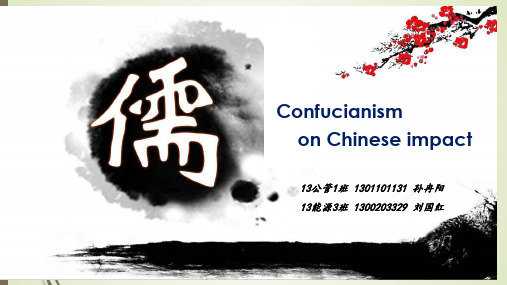
When I am fifteen, I aspired to learn. At thirty, I can be independent. At forty, I am not deluded. At fifty, I knew my destiny. At sixty, I knew truth in all I heard. At seventy, I could follow my heart’s desire without overstepping the line. (吾十有五而志于学,三十而立,四十而不惑,五十而知天命,六十而耳顺, 七十而从心所欲,不逾矩)
Confucianism on Chinese impact
13公管1班 1301101131 孙冉阳 13能源3班 1300203329 刘国红
The Confucianist politics socialization's process, is the Confucianist politics ideal trend practice process, was also an ancient times Ideological and political education process. Dong Zhongshu is causes the Confucianist politics from the founder who moves toward the reality ideally, is also causes the Confucian thoughts political education to step onto road's of the practice earlier worker from the theory. He has constructed the Han Dynasty Confucian thoughts political education primary coverage and the goal, advanced the Confucian thoughts political education socialization movement.
孔子及其思想中英文
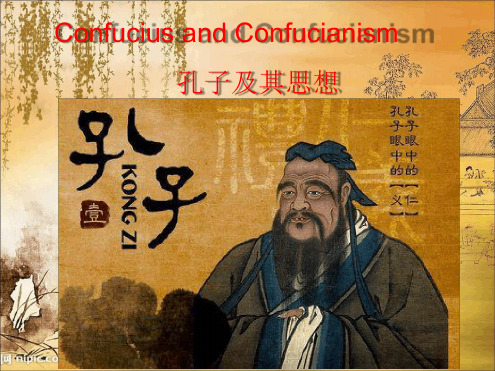
The Confucian thought has far-reaching influence on China and the world, Confucius is listed as the world's top ten cultural celebrities.
? Confucius (551 B.C —479 B.C.) is one of the most famous Chinese people.
? As the founder of Confucianism, his thought has exerted a deep influence on China and its people.
Ren meant to “love other men”.For the person who have Ren, if treat others with generous,others will reward you Ren; if tforbear others, others will forbear you. “仁”就是“爱人”。“夫仁者,己欲立而立人,己欲达而达人” (此句意指:仁爱之人,自己决定对人建立仁爱之心,别人才会对你仁爱,自 己决定对人宽容,别人才会对你宽容。
Confucius and Confucianism 孔子及其思想
孔子简介 the brief of Confucius
孔子(公元前551年—公元前479年)是中国 最著名的人物。作为儒家创始人,他的思想一直 在中国有着深远的影响。但孔子不是他的原名, 而是一种尊称,是孔夫子的拉丁文。孔子姓孔名 丘,字仲尼,出生在鲁国陬邑(今山东曲阜东 南)。
儒家思想英文介绍概要
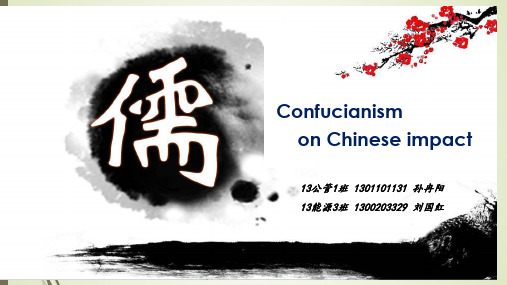
(372-289BC)
Xunzi is another Confucian philosopher who lived during the Warring States period. He believed man's inborn tendencies need to be curbed through education and ritual.
(312–230 BC)
(179–104 BC)
Dong zhongshu ,who is a Han Dynasty Chinese scholar, promoted Confucianism as the official ideology of the Chinese imperial state. He advocated “oust others doctrines,the overwhelming Confucianism”(罢黜百家,独尊儒术)
七十而从心所欲,不逾矩)
Mencius is the representative of Confucian during the Warring States. He was a Chinese philosopher who is the most famous Confucian after Confucius. He inherited the Confucianism,and made it further more systematic.
Байду номын сангаас
2.Introdunction of Confuciansim
A school of thought represented by Confucius and Mencius. A set of moral and social values designed to bring ways of man and government in harmony with each other and with the universe.
先秦时期的儒家思想介绍英文

Human Good Nature
• every man is good by nature and all men have natural sympathies. The reason why some people do evil is that they have lost the consciousness and betrayed their own good nature. Consequently, Mencius put forward a theory of self-cultivation, that is, self-examination or selfreflection, or trying to find fault in oneself so as to seek the innate goodness and conscience in oneself. One of the famous sayings of Mencius is that “neither riches nor honors can corrupt him; neither poverty nor lowly position can make him swerve from principle; neither threats nor force can bend him”, which gives expression to the power of moral character. The theory of original goodness of human nature expounds and verifies, from the perspective of human nature, that benevolent government complies with human nature and is therefore justified.
儒家的教育思想总结英文

儒家的教育思想总结英文Confucianism, one of the most influential philosophies in Chinese history, has had a profound impact on education. During the ancient and imperial eras, Confucian ideas shaped the educational system and influenced the development of individuals and the society as a whole. The essence of Confucian education lies in its emphasis on personal cultivation, moral development, and the pursuit of knowledge. This essay aims to summarize the key aspects of Confucian educational philosophy.Confucianism places great importance on the role of education in shaping individuals' character and guiding their actions. Confucius believed that education is instrumental in transforming individuals into morally upright people. He emphasized the cultivation of virtues, such as benevolence, righteousness, and loyalty, which are considered essential for maintaining social harmony and order. Confucius believed that education should focus on shaping the individual's character and guiding their behavior. This emphasis on character development forms the foundation of Confucian education.One key concept in Confucian education is ren (仁), often translated as "benevolence" or "humanity." Ren is the virtue that encompasses empathy, compassion, and a genuine concern for others. Confucius believed that education should instill a strong sense of ren in individuals, fostering a harmonious relationship between themselves and others. By cultivating ren, individuals can contribute to the betterment of society and establish a moral order where each person treats others with kindness and respect.Another critical aspect of Confucian education is li (礼), which can be translated as "ritual" or "propriety." Li represents the norms, rituals, and etiquette that govern social interactions. Confucius believed that education should teach individuals the proper way to behave and conduct themselves in various social contexts. By following li, individuals can show respect to others, maintain harmony, and uphold social order. Confucian education places great emphasis on teaching the correct expression of li to ensure individuals' appropriate behavior and promote harmonious social relationships.Confucius also stressed the pursuit of knowledge and the continuous pursuit of learning. He believed that education should inspire individuals to seek knowledge and strive for personal growth. This idea is encapsulated in the concept of xue (学), which embodies the importance of education, self-improvement, and intellectual cultivation. Confucian education encourages individuals to engage in lifelong learning, constantly seeking knowledge and enhancing their intellectual capabilities. This pursuit of knowledge is believed to contribute to the development of a well-rounded individual who is not only morally upright but also intellectually competent.Confucian education also emphasizes the importance of filial piety, or xiao (孝), which refers to the respect and care that individuals owe to their parents and ancestors. Confucius considered filial piety as the foundation of moral conduct, believing that individuals who fulfill their duty to their parents will naturally extend this virtuous behavior to society at large. Confucian education instills the values of filial piety in individuals, teaching them to honor andrespect their parents, and emphasizing the importance of family harmony in society.In summary, Confucian education revolves around the cultivation of virtues, the pursuit of knowledge, and the proper conduct within social relationships. It emphasizes the importance of personal character development, moral behavior, and the continuous pursuit of learning. Through the teachings of Confucianism, individuals are encouraged to become morally upright, intellectually competent, and responsible members of society. Confucian education has played a significant role in shaping Chinese society, and its influence can still be seen in contemporary Chinese educational practices.。
儒家思想英文总结范文

Confucianism, as one of the most influential philosophical and ethical traditions in Chinese history, has played a crucial role in shaping the moral and social norms of East Asia. It was founded by Confucius, a Chinese philosopher who lived from 551 to 479 BCE. Over the centuries, Confucianism has spread to various regions and has been integrated into different cultures, thereby contributing to the development of human civilization. This essay aims to provide a summary of Confucianism, highlighting its core principles, major figures, and impacts on society.Confucianism is based on the teachings of Confucius, who emphasized the importance of moral values and social harmony. The central ideas of Confucianism include the following:1. Ren (Humaneness or Benevolence): Ren is the core of Confucian ethics, which emphasizes the importance of love and concern for others. It is the basis for maintaining harmonious relationships in society.2. Li (Ritual or Proper Conduct): Li refers to the rules and conventions that govern social behavior. It is essential for maintaining order and harmony in society.3. Xiao (Filial Piety): Xiao is the respect and care for one's parents and ancestors. It is considered the foundation of moral education and social order.4. Yi (Righteousness): Yi is the moral disposition that leadsindividuals to act in accordance with moral principles and societal norms.5. Zhi (Wisdom): Zhi is the ability to make rational decisions and judgments based on moral principles and knowledge.Confucianism has had a profound impact on various aspects of East Asian societies. Some of the major impacts include:1. Education: Confucianism has greatly influenced the educational systems in East Asia. It emphasizes the importance of moral education and the cultivation of virtues.2. Government: Confucianism has played a significant role in shaping the political systems of East Asian countries. It promotes the concept of meritocracy and the rule of law.3. Family: Confucianism emphasizes the importance of family values and the roles of family members. It promotes the idea of harmony and mutual respect within the family.4. Business: Confucianism has had an impact on the business practices in East Asia. It emphasizes the importance of ethical conduct, loyalty, and mutual trust in business relationships.5. Art and Literature: Confucianism has influenced the development ofart and literature in East Asia. Many traditional Chinese works of art and literature reflect the values and principles of Confucianism.Some of the major figures in Confucianism include Confucius, Mencius, Xunzi, and Zhu Xi. Confucius, as the founder of Confucianism, is knownfor his teachings on Ren, Li, Xiao, Yi, and Zhi. Mencius, a student of Confucius, emphasized the importance of innate goodness in human nature and the role of government in promoting moral values. Xunzi, another student of Confucius, focused on the role of education in cultivating moral virtues. Zhu Xi, a Neo-Confucian philosopher, integrated Confucianism with Buddhism and Taoism, emphasizing the importance ofself-cultivation and the pursuit of spiritual harmony.In conclusion, Confucianism is a rich and complex philosophical and ethical tradition that has had a profound impact on East Asian societies. Its core principles, such as Ren, Li, Xiao, Yi, and Zhi, continue to influence the moral and social norms of East Asia. As we move forward, the wisdom and values of Confucianism remain relevant and can serve as a guide for building a more harmonious and moral society.。
写一篇英语作文对儒家思想的理解

写一篇英语作文对儒家思想的理解英文回答:Confucianism is a system of ethical and political thought that originated in China during the 5th century BCE. It is based on the teachings of Confucius, a renowned philosopher and social theorist, and has had a profound impact on Chinese society for centuries.Confucianism emphasizes the importance of social harmony and order, and advocates for the cultivation of virtue and morality. It teaches that individuals have a responsibility to fulfill their roles within society and to respect those in positions of authority. The core values of Confucianism include:Benevolence (Rén): Compassion, empathy, and concernfor the well-being of others.Righteousness (Yì): Acting in accordance with moralprinciples and ethical standards.Propriet y (Lǐ): Adhering to social norms, rituals, and customs.Wisdom (Zhì): Acquiring knowledge, understanding, and practical wisdom.Trustworthiness (Xìn): Being reliable, honest, and fulfilling one's promises.Confucians believe that society can achieve harmony and order through the cultivation of these virtues. They emphasize the importance of education in developing moral character and preparing individuals for their roles in society. The Confucian educational system focuses on the study of classical texts, history, literature, and music.Confucius also emphasized the importance of government in maintaining social order. He believed that rulers have a responsibility to set a moral example for their subjects and to promote the well-being of the people. Confucianismadvocates for a benevolent and meritocratic government that values education and talent.The influence of Confucianism can be seen in various aspects of Chinese society, including:Family structure: Confucianism places great importance on family relationships and hierarchical structures within the family.Social hierarchy: Confucianism emphasizes the importance of social harmony and order, leading to a hierarchical society with clear roles and responsibilities for each individual.Education: Education is highly valued in Confucianism as a means of developing moral character and cultivating virtue.Government: Confucianism advocates for a benevolent and meritocratic government that promotes social harmony and order.Arts and culture: Confucian values have influenced Chinese art, literature, and music, promoting themes of harmony, propriety, and benevolence.Confucianism has been criticized for its emphasis on social hierarchy and its potential to stifle innovation and individual expression. However, it remains an influential force in Chinese society, shaping ethical values, social norms, and political thought.中文回答:儒家思想,又称儒学或孔学,是中国的一种伦理和政治思想体系,起源于公元前 5 世纪的中国。
关于儒家思想的英语作文200

关于儒家思想的英语作文200英文回答:Confucianism is a system of thought and behavior that originated in ancient China during the Zhou Dynasty and was developed by the philosopher Confucius. It is based on the idea that human beings are fundamentally good and that society should be organized in a hierarchical manner with the ruler at the top and the common people at the bottom. Confucianism emphasizes the importance of education, self-cultivation, and respect for authority.Confucianism has had a profound impact on Chinese culture and society for over two thousand years. It has shaped the way Chinese people think about themselves, their relationships with others, and the world around them. Confucianism has also been influential in other parts of Asia, such as Japan, Korea, and Vietnam.中文回答:儒家思想是起源于中国春秋战国时期的一套思想和行为体系,由思想家孔子所创立。
儒家思想总结英文翻译简短
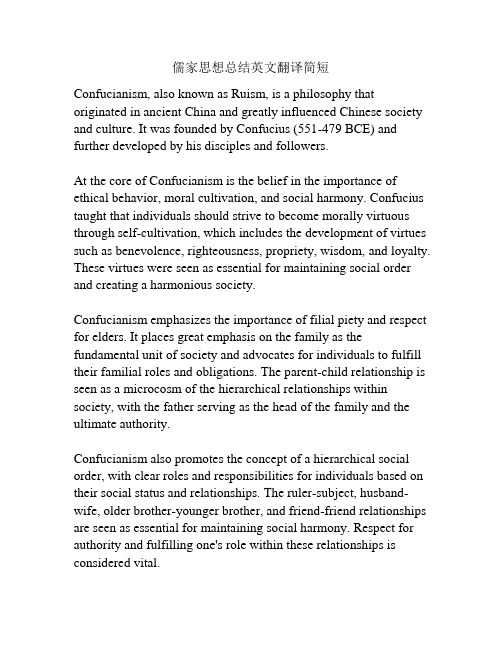
儒家思想总结英文翻译简短Confucianism, also known as Ruism, is a philosophy that originated in ancient China and greatly influenced Chinese society and culture. It was founded by Confucius (551-479 BCE) and further developed by his disciples and followers.At the core of Confucianism is the belief in the importance of ethical behavior, moral cultivation, and social harmony. Confucius taught that individuals should strive to become morally virtuous through self-cultivation, which includes the development of virtues such as benevolence, righteousness, propriety, wisdom, and loyalty. These virtues were seen as essential for maintaining social order and creating a harmonious society.Confucianism emphasizes the importance of filial piety and respect for elders. It places great emphasis on the family as the fundamental unit of society and advocates for individuals to fulfill their familial roles and obligations. The parent-child relationship is seen as a microcosm of the hierarchical relationships within society, with the father serving as the head of the family and the ultimate authority.Confucianism also promotes the concept of a hierarchical social order, with clear roles and responsibilities for individuals based on their social status and relationships. The ruler-subject, husband-wife, older brother-younger brother, and friend-friend relationships are seen as essential for maintaining social harmony. Respect for authority and fulfilling one's role within these relationships is considered vital.Education is highly valued in Confucianism as a means for self-improvement and social progress. Confucius advocated for the importance of acquiring knowledge, cultivation of moral character, and the pursuit of wisdom. Education was seen as a way to empower individuals to become virtuous and fulfill their social obligations.Confucianism also emphasizes the concept of the "gentleman" or the "noble person" (Junzi). This ideal individual embodies moral integrity, self-discipline, and wisdom. Junzi is not only concerned with personal success but also with contributing to the well-being of society. The cultivation of Junzi is seen as a lifelong process and is achieved through continuous self-reflection, learning, and practice.Furthermore, Confucianism believes in the concept of societal harmony and social order. Confucius emphasized the importance of rituals, ceremonies, and proper behavior as a means to maintain social harmony. These rituals and ceremonies were seen as ways to express respect, gratitude, and reverence. Confucianism also promotes the idea of "ren" or "humanity," which is the moral obligation to act with empathy, kindness, and benevolence towards others.In summary, Confucianism is a philosophy centered around moral cultivation, ethical behavior, and social harmony. It places great emphasis on the importance of virtues, filial piety, hierarchical relationships, education, and the pursuit of the ideal of the Junzi. Confucianism has greatly influenced Chinese society and continues to have a lasting impact on Chinese culture and values.。
儒家仁爱思想英文作文

儒家仁爱思想英文作文Confucianism's idea of benevolence is deeply ingrained in Chinese culture. It's about treating others with kindness and compassion, just like you want to be treated. For instance, imagine a scenario where you see an elderly person struggling with their bags. In Confucian thinking, it's natural to lend a helping hand, not for any reward but simply because it's the right thing to do.Another aspect of this philosophy is the emphasis on harmony. In a family, for example, benevolence means respecting elders, caring for the young, and fostering a sense of unity. It's about creating an environment where everyone feels valued and can contribute to the overall well-being.Beyond the family, benevolence also extends to society. It encourages us to be tolerant of others' differences, to help those in need, and to work together for the greater good. In a Confucian society, individual success is notmeasured solely by wealth or status but by how much one contributes to the well-being of the community.And let's not forget the role of self-cultivation. Benevolence starts with oneself. It's about cultivating a kind and compassionate heart,。
儒家文化(英汉双语)

儒家文化Confucian CultureBy nature, men are nearly alike; by practice, they get to be wide apart.性相近,习相远。
Confucius孔子Confucius (551-479 BC) was a Chinese educationist, politician, and philosopher(哲学家) of the Spring and Autumn Period of Chinese history. Confucius' family and personal name respectively was Kong Qiu(孔丘). His courtesy name was Zhongni(仲尼). In Chinese, he is most often known as Kongzi. He is also known by the honorific Kong Fuzi.It was said that Confucius credited or edited many of the Chinese classic texts including all of the Five Classics(《五经》), but modern scholars are cautious(谨慎的)of attributing specific assertions(声称) to Confucius himself. Aphorisms(警句) concerning his teachings were compiled in the Analects《论语》), but only many years after his death.The philosophy of Confucius emphasized personal and governmental morality, correctness of social relationships, justice and sincerity. His followers competed successfully with many other schools during the Hundred Schools of Thought(诸子百家)era only to be suppressed in favor of the legalists(法学家) during the Qin Dynasty.Following the victory of Han over Chu after the collapse of Qin, Confucius's thoughts received official sanction(认可) and were further developed into a system known as Confucianism.Confucius's principles were deeply rooted in Chinese tradition and belief. He championed(拥护) strong family loyalty, ancestor worship, respect of elders by their children and of husbands by their wives. He also recommended(推荐) family as a basis for ideal government. He espoused(信奉) the well-known principle “Do not do to others what you do not want done to yourself", an early version of the Golden Rule.Soon after Confucius's death, Qufu, his hometown became a place of devotion(虔诚) and remembrance(纪念). It was a tradition of holding spectacular memorial ceremonies of Confucius every year. The Han dynasty Records of the Grand Historian records that it had already become a place of pilgrimage(朝拜) for ministers. It is still a major destination for cultural tourism, and many people visit his grave and the surrounding temples. There are also many temples dedicated to him, which have been used for Confucianism ceremonies.阅读参考:孔子(公元前551一前479)是中国春秋时期的一位教育家、政治家和哲学家。
- 1、下载文档前请自行甄别文档内容的完整性,平台不提供额外的编辑、内容补充、找答案等附加服务。
- 2、"仅部分预览"的文档,不可在线预览部分如存在完整性等问题,可反馈申请退款(可完整预览的文档不适用该条件!)。
- 3、如文档侵犯您的权益,请联系客服反馈,我们会尽快为您处理(人工客服工作时间:9:00-18:30)。
比如“钓鱼岛”事件,我们应该时刻保持着忧患意
2)民本思想。当然古代“民本”的真正内涵,不是也不可能是人民的利益。今天我们剔
则可以从人民当家作主的角度来转化古代的民本思想,将其发展为人民的利
3)天人合一、人与自然和谐相处。对于提倡构建和谐社vancing with the times: Traditional Confucian thoughts have a far-reaching
4)中庸精神是儒家思想的精华。中国文化就是以中庸精神为核心的礼乐文化。作为传统
5)与时俱进的时代精神。儒家传统思想发展至今,之所以影响深远,关键在于它能根据
today's discourse is concerned, Confucianism was understood to be the core of human
The spirit of unremitting self-improvement and suffering consciousness: Unremitting
,our country still faces many challenges, such as "Diaoyu islands" event, we should
The thought of the people: Of course, the real connotation of the ancient "people", not the
people from the perspective of the people be in power, its development for the people's
(自律道
),犹如西方的无宗教信仰的人一样,永远是个不健全的人。
在古代中国儒家思想就被理解为人类文明的核心。面对这些资源,现代
可以吸收资源里面的一些成分,也可抛弃一些成分。我觉得我们应
那就是包容,即古为今用,批判继承。儒家思想对我们
1)自强不息的精神和忧患意识。自强不息是中华民族生生不息永葆青春活力的不竭动力,
